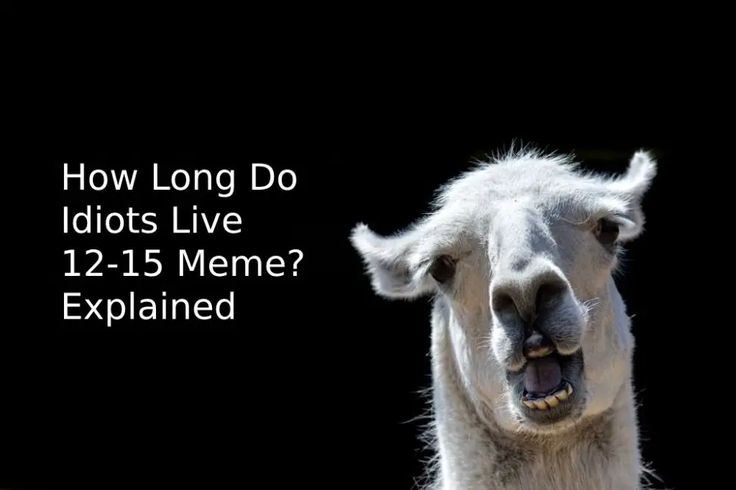Introduction
If you’ve spent any time scrolling through TikTok or YouTube Shorts in the past few years, you may have stumbled upon a peculiar question: “How long do idiots live?” At first glance, it seems like an odd or even rude inquiry. But as with much of internet humor, the question isn’t meant to be taken literally. It’s part of a meme—one that reflects the internet’s surreal and ironic humor, while also opening up some interesting conversations about intelligence, perception, and the strange ways we connect online.
So, how long do idiots live? The viral answer, if you’re following the meme’s script, is: “12 to 15 years.” But let’s unpack this more carefully. Where did this come from? What does it really mean? And why do people keep saying “I’ll never forget you, goodbye” in response?
Let’s dig in.
The Origin of the Meme
The phrase “how long do idiots live?” became popular on TikTok around 2021. Users would type the question into Google (often as a joke) and then show the supposed answer: “12–15 years.” Following that, videos would end with a heartfelt or exaggerated message like “I’ll never forget you,” suggesting the person they’re addressing just turned 16 and has therefore outlived their supposed life expectancy—according to the meme.
Of course, Google doesn’t actually provide this as a real answer. It’s fabricated for comedic effect. Someone likely created a fake screenshot or cleverly edited a search result, and from there, the joke caught fire. TikTokers used it in countless ways—sometimes to poke fun at friends, sometimes as a form of dark humor, and often as a self-deprecating joke.
Why This Kind of Humor Works
This meme fits into a larger category of absurdist internet humor that thrives on irony, misdirection, and unexpected sincerity. The joke starts as a roast but quickly turns into something oddly sentimental. That tonal shift is what gives it its staying power.
It’s similar to other memes where humor and emotional vulnerability collide. For example, memes that begin with “me: [insert dumb mistake]” and end with “me to myself: I’m so proud of you for trying.” The mix of silliness and sincerity resonates with a generation that has grown up communicating in layers of irony and introspection.
The Psychology of Calling Someone an ‘Idiot’
Let’s step away from the meme for a moment and talk about the word “idiot.” Historically, “idiot” was once a clinical term used in the early 20th century to describe individuals with certain intellectual disabilities. Thankfully, it has long since been discarded from medical use due to its demeaning and stigmatizing connotations. Today, it’s a colloquial insult—blunt, but not always meant with cruelty.
When used online, especially in memes, “idiot” is often code for someone who does something silly, embarrassing, or impulsive. It doesn’t necessarily reflect their intelligence. In fact, the people sharing these memes are usually poking fun at themselves or close friends in a lighthearted, non-malicious way.
Still, it’s worth being mindful. Language shapes perception, and repeated use of insulting terms—even as jokes—can affect how we view ourselves and others. It’s one thing to joke among friends; it’s another to aim these words at people who might take them to heart.
Do ‘Idiots’ Really Live 12–15 Years? (Spoiler: No)
Let’s clear this up once and for all: there is no scientific basis for the claim that “idiots live 12 to 15 years.” It’s a joke. A meme. A made-up statistic.
In reality, intelligence—however you define it—does not directly correlate with lifespan in such a simple or extreme way. A person’s life expectancy is influenced by a complex set of factors: genetics, environment, access to healthcare, diet, socioeconomic status, education, and even mental health.
In fact, many studies show that emotional intelligence, resilience, and social connections have more impact on long-term health than IQ alone. And people who laugh at themselves, share memes, and build online communities may be tapping into one of the most powerful survival tools we have: connection.
What the Meme Says About Us
If there’s a deeper takeaway from this meme, it’s this: we’re all a little foolish sometimes. Whether it’s making a cringe decision, saying the wrong thing, or just navigating life without an instruction manual, no one really has it all figured out.
And that’s okay.
By calling ourselves “idiots” in a joking way, we’re acknowledging our own imperfection. We’re using humor to cope, to bond, and sometimes to express emotions we can’t say out loud—like “I care about you” or “I’m scared of growing up” or “I miss who we used to be.”
So when someone says, “how long do idiots live?” and another replies, “12–15 years,” followed by “I’ll never forget you,” what they’re really saying might be something deeper: “Even if we drift apart or grow up or change, I’m glad you were part of my life.”
The Role of Internet Culture in Modern Humor
Internet humor has become increasingly meta and emotionally layered. What started as a simple, ironic phrase like “how long do idiots live” evolves into an emotionally loaded farewell. These jokes reflect how people—especially younger generations—use humor as a language for dealing with stress, trauma, and existential questions.
In a way, these memes are modern fables. They’re shorthand for life experiences that are too complex to explain directly. And they’re a reminder that behind every joke is a real person, often using humor as a coping mechanism, a love letter, or even a goodbye.
Final Thought
The real answer? As long as anyone else. Maybe longer—because they’re laughing, connecting, and not taking life too seriously.
In the end, we’re all “idiots” in some way. And that’s part of being human. The next time you see that question pop up in your feed, remember: it’s not just a meme. It’s a glimpse into how we, as a digital generation, make sense of growing up, messing up, and holding on to each other in a world that’s always changing.


